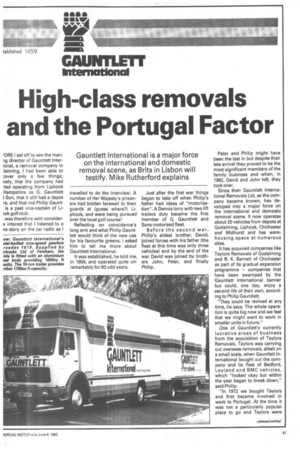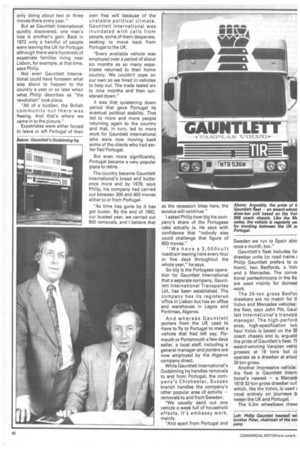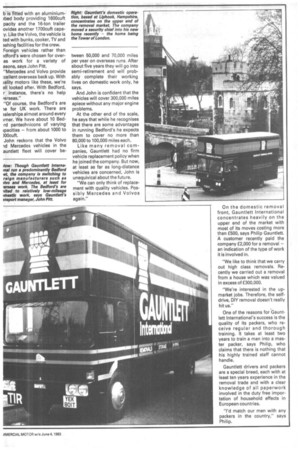High-class removals and the Portugal Factor
Page 63

Page 64

Page 65

If you've noticed an error in this article please click here to report it so we can fix it.
Gauntlett International is a major force on the international and domestic removal scene, as Brits in Lisbon will testify. Mike Rutherford explains
'ORE I set off to see the manng director of Gauntlett Interional, a removal company in claiming, I had been able to :over only a few things; nely, that the company had rted operating from Liphook Hampshire as G. Gauntlett Son, that it still had a depot re, and that md Philip Gauntis a past vice-captain of Li)ok golf club.
was therefore with consider e interest that I listened to a vs story on the car radio as I travelled to do the interview: A number of Her Majesty's prisoners had bidden farewell to their guards at (guess where?) Liphook, and were being pursued over the local golf course!
Reflecting on coincidence's long arm and what Philip Gauntlett would think of the new use for his favourite greens, I asked him to tell me more about Gauntlett International.
It was established, he told me, in 1859, and operated quite unremarkably for 60 odd years. Just after the first war things began to take off when Philip's father had ideas of "motorisation". A Dennis lorry with two lift trailers duly became the first member of G. Gauntlett and Sons motorised fleet.
Before the second war, Philip's eldest brother, David, joined forces with his father (the fleet at this time was only three vehicles) and by the end of the war David was joined by brothers John, Peter, and finally Philip. Peter and Philip might have been the last in but despite their late arrival they proved to be the most significant members of the family business and when, in 1962, David and John left, they took over.
Since then Gauntlett International Removals Ltd, as the company became known, has developed into a major force on the international and domestic removal scene. It now operates about 20 vehicles from depots at Godalming, Liphook, Chichester and Midhurst and has warehousing space at numerous sites.
It has acquired companies like Taylors Removals of Godalming and R. K. Barnett of Chichester as part of its gradual expansion programme — companies that have been swamped by the Gauntlett International banner but could, one day, enjoy a second life of their own, according to Philip Gauntlett.
"They could be revived at any time, he says. The whole operation is quite big now and we feel that we might want to work in smaller units in future."
One of Gauntlett's currently lucrative areas of business from the acquisition of Taylors Removals. Taylors was carrying out overseas removals, albeit on a small scale, when Gauntlett International bought out the company and its fleet of Bedford, Leyland and BMC vehicles, which "looked okay but within the year began to break down," said Philip.
"In 1972 we bought Taylors and first became involved in work to Portugal. At the time it was not a particularly popular place to go and Taylors were only doing about two or three moves there every year."
But as Gauntlett International quickly discovered, one man's loss is another's gain. Back in 1972 only a handful of people were leaving the UK for Portugal although there were hundreds of expatriate families living near Lisbon, for example, at that time, says Philip.
Not even Gaurttlett International could have foreseen what was about to happen to the country a year or so later when what Philip describes as "the revolution" took place.
"All of a sudden, the British community out there was fleeing. And that's where we came in to the picture."
Expatriates were either forced to leave or left Portugal of their own free will because of the unstable political climate. Gauntlett International was inundated with calls from people, some of them desperate, seeking to move back from Portugal to the UK.
"Every available vehicle was employed over a period of about six months as so many expatriates returned to their home country. We couldn't cope on our own so we hired in vehicles to help out. The trade lasted six to nine months and then quietened down."
It was that quietening down period that gave Portugal its eventual political stability. That led to more and more people returning again to the country and that, in turn, led to more work for Gauntlett International, who were now moving back some of the clients who had earlier fled Portugal.
But even more significantly, Portugal became a very popular place to retire.
The country became Gauntlett International's bread and butter once more and by 1978, says Philip, his company had carried out between 300 and 400 moves either to or from Portugal.
"As time has gone by it has got busier. By the end of 1982, our busiest year, we carried out 800 removals, and I believe that as the recession bites here, the exodus will continue."
I asked Philip how big his company's share of the Portugese cake actually is. He says with confidence that "nobody else could challenge that figure of 800 moves."
"We have a 3,0 0 Ocuft roadtrain leaving here every four or five days throughout the whole year," he says.
So big is the Portugese operation for Gauntlett International that a separate company, Gauntlett International Transportes Ltd, has been established. The company has its registered office in Lisbon but has an office and warehouse in Lagoa and Portirnao, Algarve, And whereas Gauntlett 'porters from the UK used to have to fly to Portugal to meet a 'vehicle that had left say, Plymouth or Portsmouth a few days ealier, a local staff, including a general manager and porters are now employed by the Algarve company direct.
While Gauntlett International's Godalming hq handles removals to and from Portugal, the company's Chichester, Sussex branch handles the company's other popular area of activity — removals to and from Sweden.
"We usually send out one vehicle a week full of household effects. It's embassy work, mainly.
"And apart from Portugal and Sweden we run to Spain ebb once a month, too."
Gauntlett's fleet includes fol drawbar units (or road trains Philip Gauntlett prefers to them), two Bedfords, a Vol\ and a Mercedes. The conve tional pantechnicons in the tie are used mainly for dornest work.
The 26-ton gross Bedfoi drawbars are no match for if Volvo and Mercedes vehicles the fleet, says John Pitt, Gaur lett International's transpo manager. The high-perforn ance, high-specification Ion' haul Volvo is based on the BI coach chassis and is, arguabl the pride of Gauntlett's fleet. TI award-winning Vanplan vehic grosses at 16 tons but cE. operate as a drawbar at arour 30 ton gross.
Another impressive vehicle the fleet is Gauntlett Intern tional's newest — a Mercedi 1619 32-ton gross drawbar out which, like the Volvo, is used most entirely on journeys b tween the UK and Portugal.
The 5.2m wheelbase chess b is fitted with an aluminium)bed body providing 1600cuft pacity and the 16-ton trailer ovides another 1700cuft capa:y. Like the Volvo, the vehicle is ted with bunks, cooker, TV and ashing facilities for the crew. Foreign vehicles rather than .1.dford's were chosen for overas work for a variety of asons, says John Pitt.
"Mercedes and Volvo provide :cellent overseas back up. With Jality motors like these, we're ell looked after. With Bedford, r instance, there's no help terseas."
"Of course, the Bedford's are le for UK work. There are 3alerships almost around every nner. We have about 10 Bedrd pantechnicons of varying ipacities — from about 1000 to )00cuft.
John reckons that the Volvo ld Mercedes vehicles in the auntlett fleet will cover be tween 50,000 and 70,000 miles per year on overseas runs. After about five years they will go into semi-retirement and will probably complete their working lives on domestic work only, he says.
And John is confident that the vehicles will cover 300,000 miles apiece without any major engine problems.
At the other end of the scale, he says that while he recognises that there are some advantages in running Bedford's he expects them to cover no more than 80,000 to 100,000 miles each.
Like many removal companies, Gauntlett had no firm vehicle replacement policy when he joined the company. But now, at least as far as long-distance vehicles are concerned, John is unequivical about the future.
"We can only think of replacement with quality vehicles. Possibly Mercedes and Volvos again." On the domestic removal front, Gauntlett International concentrates heavily on the upper end of the market with most of its moves costing more than £500, says Philip Gauntlett. A customer recently paid the company £2,000 for a removal — an indication of the type of work it is involved in.
"We like to think that we carry out high class removals. Recently we carried out a removal from a house which was valued in excess of £300,000.
"We're interested in the upmarket jobs. Therefore, the selfdrive, DIY removal doesn't really hit us."
One of the reasons for Gauntlett International's success is the quality of its packers, who receive regular and thorough training. It takes at least two years to train a man into a master packer, says Philip, who claims that there is nothing that his highly trained staff cannot handle.
Gauntlett drivers and packers are a special breed, each with at least ten years experience in the removal trade and with a clear knowledge of all paperwork involved in the duty free importation of household effects in European countries.
"I'd match our men with any packers in the country," says Philip.
































































































